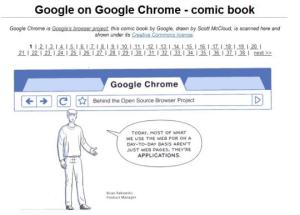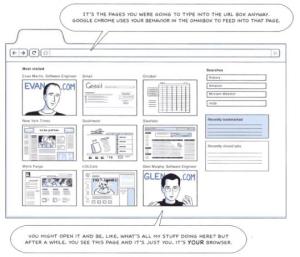A version of Google’s new Chrome browser will find itself onto the company’s Android mobile platform, according to company co-founder Sergey Brin.
From Computerworld:
In yet another example of Google Inc.‘s expanding influence, the search company’s co-founder, Sergey Brin, said he expects the new Google browser, Chrome, to eventually become part of the Android wireless phone platform, which is under separate development by the Google-led Open Handset Alliance.
Brin, in an interview with CNET at the Chrome announcement yesterday, said that “probably a subsequent version of Android is going to pick up a lot of the Chrome stack.” Google officials were unavailable to elaborate.
Although they are being developed separately, both Chrome and Android’s browser rely on WebKit open-source software for interpreting the HTML code that builds and renders a Web page.
The first Android phone is expected to launch in November. Known as the Dream phone, it will be manufactured by HTC and will be first sold in the U.S. by T-Mobile.
Google’s ultimate ability to increase its influence in the mobile device market may well depend on whether a mobile Chrome browser is used in any other phones that use Android software, several analysts said. The mobile browsers available today include FireFox, Internet Explorer, Opera and the emerging Skyfire.
From InformationWeek:
Android and Chrome were developed separately, but will probably be tied closer now that the first Android-powered handsets are just around the corner.
“Probably a subsequent version of Android is going to pick up a lot of the Chrome stack,” Brin said in an interview with Cnet Tuesday. The search company unveiled Chrome Tuesday to much fanfare as the company claims the open-source browser is the fastest out there.
Chrome is built on Apple’s WebKit engine, and includes a JavaScript engine that’s designed to handle multiple processes, each with its own memory. Additionally, the browser has draggable tabs, and it has been optimized to be used with Web applications, including the company’s Gmail, Google Docs, and more.
While features like multiple sandboxed processes would probably not make the cut on a cell phone, a mobile version would probably be built on the same fundamental technologies. Being able to easily and efficiently integrate with Web apps could give Android an advantage in the increasingly competitive mobile browser market.
Take a spin through our Google Chrome image gallery and have a look at the browser that’s being touted as a game-changer.
From CNET:
Google’s new Chrome browser is for PCs today, but company co-founder Sergey Brin expects the technology will make its way to Android, the company’s mobile phone operating system and software suite.
Chrome and Android were developed largely separately, Brin said in an interview at the Chrome launch event Tuesday. “We have not wanted to bind one’s hands to the other’s,” Brin said. But you can expect that to change now that both projects are public and nearing their first final releases.
“Probably a subsequent version of Android is going to pick up a lot of the Chrome stack,” Brin said, pointing to JavaScript improvements as one area.
And the brand name likely will follow. “My guess is we’ll have ‘Chrome-like’ or something similar,” he said.
Chrome and Android’s current browser both already employ WebKit, an open-source project for the process of interpreting the HTML code that makes up a Web page and rendering it on a screen.





Recent Comments